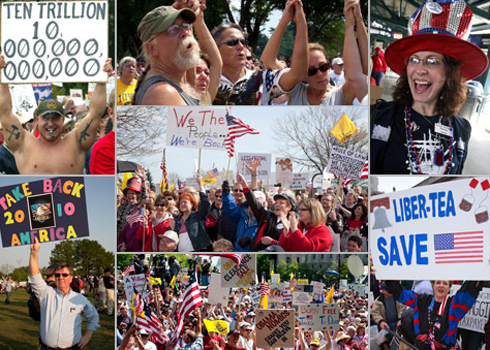Here are two words you’re going to hear a lot of in the next couple months: voter enthusiasm. Simply put, polls show Republican voters are super-extra-with-sugar-on-top excited to cast their protest votes against President Obama and his socialist cronies this November while Democrats are — to put it mildly — a lot less jazzed about casting a vote for the team currently in charge.
The split has come to define the polling of the cycle. Generic ballot polling of registered voters — that is, everyone who could vote on election day — has shown the electorate to be essentially split, with half favoring Democratic control of Congress and half welcoming the reign of Speaker Boehner. When likely voters (the group who theoretically will turn out in the end) are asked how they’re going to vote, Republicans leap out to a big lead.
For example, in a recent NBC/WSJ poll, the parties were split at 43% support when all adults surveyed were asked who they’d rather see in control of Congress next year. But when likely voters were asked the same question, the GOP took a nine-point lead. Polling from other firms this year has shown a similar result.
“We have two ways of looking at the enthusiasm gap: measuring whether voters are very, somewhat, or not at all excited about voting this fall, and then a step beyond that looking at how they voted for President in 2008,” Public Policy Polling’s Tom Jensen told me when I asked him to explain how screenings of likely voters work. “We’re consistently finding that very excited voters are going strongly toward the GOP while somewhat and not at all excited voters are supporting Democrats.”
PPP, a Democratic-leaning pollster, has been right an awful lot this election season. And for now, Jensen says his numbers show that the people who say they really want to vote are planning to vote for the GOP. “Of course it doesn’t really matter whether you’re excited or not if you actually show up and vote,” he said. “[It] counts just the same. But that’s why we ask people how they voted in 2008 — to get a sense of how those planning to vote this year match up to who voted last time.”
Jensen says his polls show “about a 6-point shift in a Republican direction in who’s coming out this time.” (For the number-types out there, Jensen illustrates the concept like so: “If a state voted for Obama by four points in 2008, this year’s voters are likely to have voted for John McCain by two points, and so forth.”)
Other polls have shown the boost in enthusiasm too. The much-ballyhooed (by Democrats) Gallup generic congressional ballot poll showing the parties tied among registered voters this week also showed Republicans with a whopping 25-point lead when it came to the number of voters who say they’re “very enthusiastic” about turning out.
Real-world results show this boost in enthusiasm among Republicans is no fluke. As the New York Daily News‘ Michael McAuliff reports, “turnout in Republican primaries is exceeding (by a lot!) Democratic turnout for the first time since 1930.” McAuliff cites a report showing “a 4.2 million-vote edge for Republicans.” For contrast: “before the 2006 general election, Dems had about a 3 million-vote lead,” he writes, “and look how well that served them.” (The TPM Poll Average shows Republicans leading in congressional generic ballot surveys 47.3-40.7. The tracker includes registered and likely voter surveys.)
The shift means many Democrats are running in a world very different from the one Obama did in 2008. The president hasn’t done a great job solidifying the supporters he won over two years ago, leaving candidates struggling in a 2010 environment in which the pool of likely voters might have very well elected John McCain president in 2008.
“Obama has won over basically no one to the Democrats since he took office,” Jensen said. “He hasn’t actually lost that many people either.”
“But if you’re a Democrat running in a state like Ohio or Pennsylvania and a majority of the folks who are turning out voted for McCain, and you’re not winning over any of them, that makes it virtually impossible for you to win,” he added.
So, is it all over but the shouting? Can Democrats close the gap or will a super-pumped GOP electorate meet a tiny group of Democrats in bathrobes groaning “I’ll get to it when I get to it” at their polling places on Election Day? Jensen said that recent elections that didn’t go too well for the Democrats — the gubernatorial races in New Jersey and Virgina last year, for instance — showed that in the end, Democrats shook themselves off and rallied somewhat.
“So far this cycle Democratic interest in voting did tick up right before the elections in Virginia, New Jersey, and Massachusetts compared to where it was two weeks, a month, two months before those elections,” Jensen said. “Obviously it wasn’t enough to win, but I do think Democratic interest will creep up at least a little bit between now and the election and that could put some close races — folks like Alexi Giannoulias and Harry Reid — into the winner’s column.”









